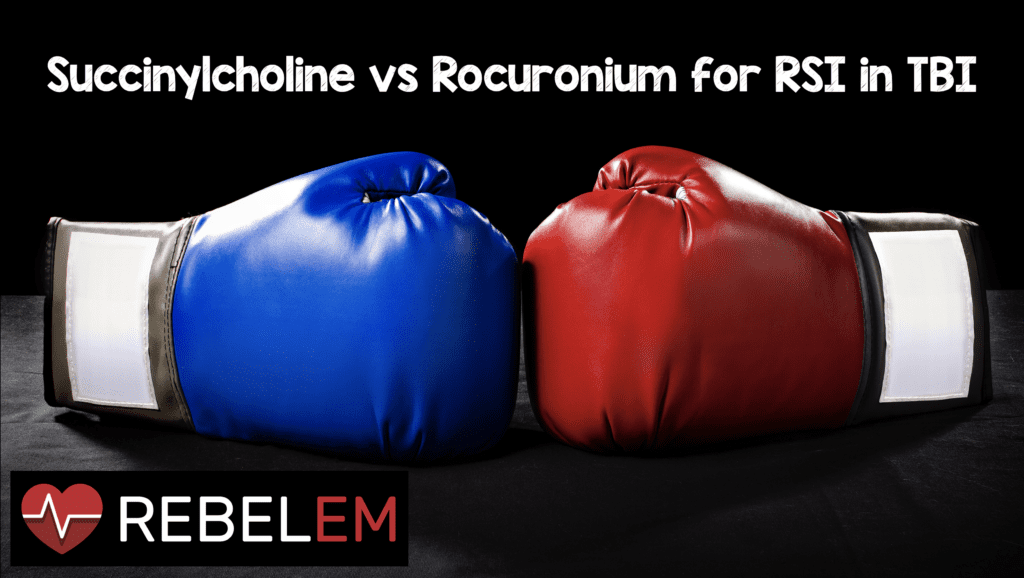
 Background: Airway management is a critical part of the management of patients presenting with traumatic brain injury (TBI). Emergency Physicians (EPs) have no ability to change the primary injury once it has occurred and so our focus is on preventing secondary brain injury. Hypoxemia and hypercarbia are major contributors to morbidity and mortality and management must focus on preventing them. Patients with TBI and depressed mental status frequently require definitive airway management in order to avoid these secondary insults. Rapid sequence intubation (RSI) with serial administration of a neuromuscular blocking agent (NMBA) and an induction agent is common practice. The most commonly used NMBAs are the depolarizing agent succinylcholine and the non-depolarizing agent rocuronium. There are strong proponents arguing for the dominance of one agent over the other based on qualities of the drugs but scant data investigating the question has led to clinical equipoise.
Background: Airway management is a critical part of the management of patients presenting with traumatic brain injury (TBI). Emergency Physicians (EPs) have no ability to change the primary injury once it has occurred and so our focus is on preventing secondary brain injury. Hypoxemia and hypercarbia are major contributors to morbidity and mortality and management must focus on preventing them. Patients with TBI and depressed mental status frequently require definitive airway management in order to avoid these secondary insults. Rapid sequence intubation (RSI) with serial administration of a neuromuscular blocking agent (NMBA) and an induction agent is common practice. The most commonly used NMBAs are the depolarizing agent succinylcholine and the non-depolarizing agent rocuronium. There are strong proponents arguing for the dominance of one agent over the other based on qualities of the drugs but scant data investigating the question has led to clinical equipoise.
Clinical Question: Which NMBA, succinylcholine or rocuronium, is preferred during RSI of patients with TBI in terms of mortality rate?
Article:
Pantawala AE et al. Succinycholine is associated with increased mortality when used for rapid sequence intubation of severe brain injured patients in the emergency department. Pharmacotherapy 2016; 36(1) 57-63. PMID: 26799349
Population: All patients > 18 years of age with a TBI who were intubated with either succinylcholine or rocuronium in the Emergency Department (ED).
Outcome (Primary): In-hospital mortality
Design: Retrospective cohort study
Primary Results
- 260 patients with TBI were intubated in the ED
- 235 patients with TBI received a NMBA
- 233 patients with TBI received either succinylcholine (n = 149) or rocuronium (n = 84) for RSI
Critical Findings
-
Succinylcholine vs. Rocuronium Mortality
- Overall: 23% vs. 23%
- Low-severity head injury: 14% vs. 22% (OR 0.75; 95% CI 0.29 – 1.92)
- High-severity head injury: 44% vs. 23% (OR 4.10; 95% CI 1.18 – 14.12)
Strengths:
- The largest study investigating the possible association between the choice of NMBA RSI for TBI and mortality
- Authors describe a possible pathophysiologic mechanism for their findings (increased ICP associated with succinylcholine administration)
Limitations:
- Retrospective study where clinicians decided NMBA agent introduces significant selection bias
- Succinylcholine group may have been sicker at baseline with more hypoxemia and hypotension (though Injury Severity Score and Head Abbreviated Injury Scale similar)
- Stratification into high and low-severity head injury (yielding the only critical finding in the study) was not the original intention of the study investigators but was performed after they identified statistical interaction
Authors Conclusions: “In severely brain-injured patients undergoing RSI in the ED, succinylcholine was associated with increased mortality compared with rocuronium.”
Our Conclusions: Thee data provided by the authors after stratification of severity of injury appears to favor the use of rocurnium over succinylcholine during RSI in patients with TBI. However, the retrospective nature of this study only provides us with an association, not causation. The study’s retrospective nature puts it at significant risk for selection bias. A prospective, randomized controlled trial is needed to further elucidate the presence or absence of a relationship between increased mortality and choice of NMBA.
Potential to Impact Current Practice: Without high-quality data, this study cannot be used to change current practice. However, in the absence of better data, this study can be used to support the use of rocuronium over succinylcholin in RSI in TBI patients.
Bottom Line: The best available data shows an association between the use of succinylcholine and mortality in patients with severe TBI requiring RSI. Rocuronium is at least equivalent in terms of outcomes but may be superior.
References
- Pantawala AE et al. Succinycholine is associated with increased mortality when used for rapid sequence intubation of severe brain injured patients in the emergency department. Pharmacotherapy 2016; 36(1) 57-63. PMID: 26799349
Check Out More on This Topic:
- UMEM Educational Pearls: Does Succinylcholine Increase Mortality in Severe TBI Patients?
- Core EM: Episode 31.0 – Rocuronium vs. Succinycholine
Post Peer Reviewed By: Salim Rezaie (Twitter: @srrezaie)
The post Succinylcholine vs Rocuronium for RSI in Traumatic Brain Injury appeared first on REBEL EM - Emergency Medicine Blog.
